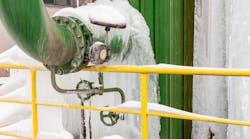Don't panic — there’s still time to address the potential hazards that come with frigid weather. And last week’s cold snap in areas not accustomed to Jack Frost nipping at their noses proves that not just areas prone to snow need to be prepared.
Indeed, the U.S. Chemical Safety and Hazard Investigation Board (CSB) released data on chemical incidents reported under the CSB’s “Accidental Release Reporting Rule” that spanned October-December 2022. The data shows a significant uptick in reportable events during the quarter, as well as an extremely high number of serious events over the Christmas weekend -- which coincides with cold temperatures across the U.S.
From October 1, 2022, through December 26, 2022, 36 events were reported to the CSB, eight of which occurred over the holiday weekend. This is more than double the number of events for the same time period in 2021 (16 events) and 2020 (14 events). Reportable events involve an accidental chemical release resulting in a fatality, serious injury and/or substantial property damage.
The uptick “may be partly due to the unique safety challenges posed by cold weather, but regardless, companies need to heighten their focus on safe operations and recognize that taking important precautionary actions, like winterization, can help prevent major chemical accidents,” notes CSB Chairperson Steve Owens in a release from the Washington, D.C.-based federal agency charged with investigating industrial chemical accidents.
A few years ago the CSB released a video (below) that highlighted findings from two catastrophic process-safety incidents – one at DuPont and the other at Valero. Both facilities are located in Texas and both were not prepared for cold weather.
The video offered these winterization tips:
- Effectively identify and address the risk of freeze-related hazards to piping and process equipment through process hazard analyses, management of change evaluations, pre-startup safety reviews and operating procedures.
- Create and implement a winterization checklist to ensure that their plant and process systems are ready for cold weather.
- Establish a formal, written freeze-protection program. Survey piping systems for dead-legs and ensure they are properly isolated, removed and winterized. A recent Chemical Processing article, Maintenance: Get Ready For The Next Big Freeze, offers additional tips.
- Systematically review process units, including infrequently used piping and equipment, to identify and mitigate freezing hazards.
Steam tracing is also an effective way to mitigate risks. Another Chemical Processing article, Time to Prepare for Winter, offers guidelines for properly designing and installing such tracing.
And don’t forget about your most important asset, your people. Dirk Willard points out that Winterization Goes Beyond Equipment.
So many things can go wrong on a daily basis in the chemical industry. Be sure to control the things you can — and remember to wear warm socks and a hat.



